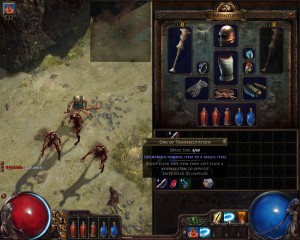Trending
Opinion: How will Project 2025 impact game developers?
The Heritage Foundation's manifesto for the possible next administration could do great harm to many, including large portions of the game development community.

Featured Blog | This community-written post highlights the best of what the game industry has to offer. Read more like it on the Game Developer Blogs or learn how to Submit Your Own Blog Post
Today's post looks at difficulty and the subject of if games should reward people for continuing to play, or if the game itself should be its own reward.

Today's post looks at difficulty and the subject of if games should reward people for continuing to play, or if the game itself should be its own reward.
Reprinted from my site: Game-Wisdom
It's been awhile since we've had a good old design debate. Game Difficulty is one of those terms that can spawn any number of topics. For today's talk on difficulty I want to focus on one area that has seen heated debates on both sides: Should difficulty reward players?

Path of Exile
One of the oldest expressions around would have to be: "With great risk comes great reward" and that has become a motto of some of the most interesting games in recent years.
The World Ends With You is one of my all time favorite games and it featured several ways for the player to affect the difficulty. The player can change the overall difficulty level of the game at anytime outside of combat, this in turn determines what kind of loot can be dropped.
The player can also control the drop rate by lowering their max health and finally they can further increase the bonuses by fighting more than one enemy group at a time.
By giving the player all these ways to fine tune the difficulty to their specifications it rewards players who take the big risks, while not hitting them over the head with intense difficulty out of the gate. More importantly is that it provides and in game benefit and reward for making the game harder, which can be a good motivator for players to learn the systems.
Games that continue to provide rewards for playing are some of the most replay-able games out there. Heck, the ARPG genre's playability is built on risk vs. rewards. With each new difficulty level, the enemies become stronger and more varied, while the loot gets better.
After all, there is a reason why people kept playing Diablo 2 or Path of Exile, Diablo 3... Not so much but that's a story for another post.
The other positive of giving the player control over difficulty is that it can help make a game more accessible. For many gamers, being hit over the head with difficulty while they're trying to learn it can be a huge turn off.
While motivating players can be a huge boon, if the designer is going for a specific design, some feel that the challenge should be all the motivation needed.
Giving the player reasons to play a game at a higher difficulty level may inspire those to learn it, but for gamers looking to be tested, they don't need any other reason.
A simple fact is that whenever designers have to implement multiple difficulty levels that requires more time spent fine tuning and play testing. This can lead to difficulty levels that are just imbalanced: either so easy that it renders the game boring, or so difficult that no one wants to play.

Path of Exile
Games like Path of Exile constantly push the player towards greater challenges with the promise of better loot.In some cases, raising the difficulty can make the game less appealing due to limitations in the design.
In strategy games like Civilization, raising the difficulty will only make the AI's strategy better to a point. After which the game will become harder by giving the AI more advantages to use and not simply playing the game better.
For many gamers, it can be annoying to have to play a game at the easy level first before getting to the hard stuff, or when the phrase "the real game begins at X" is used. Many people complained about how easy Diablo 3's starting difficulty was and how the game didn't really hit its stride until the 2nd or third play-through.
While games that give the player reasons to play at a higher difficulty can be very replay-able, games balanced around one difficulty are some of the most unique, high quality games around.
Both Demon's Souls and Dark Souls are regarded as two of the best games this generation. Neither of which gave the player any way to alter the difficulty and the games are challenging from the start. In this regard, they are well balanced and tailored around the player learning and mastering the mechanics and not being tweaked to artificially raise or lower the difficulty curve.
For many hard core gamers, the thrill of being challenged and overcoming it can be all the motivation needed. On the Game-Wisdom Podcast, we sat down with Chris Park from Arcen Games to talk about A Valley Without Wind 2 and game design.
During the chat we got on the subject of difficulty and he talked about how with their audience they don't need to add additional rewards for higher difficulty. Since their fans are more on the hardcore side, they are already more inclined to raise the difficulty of the game just for the challenge and accomplishment, over any major in-game reward.

Dark Souls
But in a game like Dark Souls, the title pushes the player to improve with the real reward being more challenges to conquer.That's why they like to set the default difficulty of their games more on the easy side, so that first time players aren't overwhelmed and they can be assured that their core fans would bump the difficulty up to be challenged.
Rogue-Likes are another good example, as many of them don't feature difficulty levels and are about challenge. The thrill of playing them is testing the player to see how far they can go in the game.
In this regard, motivating the player to test themselves with harder difficulties can provide a more meaningful reward, as it is intrinsic to the player. They're not looking for an achievement or better gear, but to prove to themselves that they can handle it.
For myself, I'm torn between the two as I'm a fan of games on both sides. I already talked about my love of The World Ends With You and Path of Exile. On the other side I loved Demon's Souls and Dark Souls and Ninja Gaiden Black is one of my favorite games.
Now, Ninja Gaiden Black is a weird choice as the developers did change the game with each difficulty level. But the game was primarily built around testing the player and seeing how far they could go.
And with that, we're now at the part of the debate where I turn the spotlight on you. Is it better to reward the player to keep playing the game, or should playing the game be all the motivation needed?
Read more about:
Featured BlogsYou May Also Like